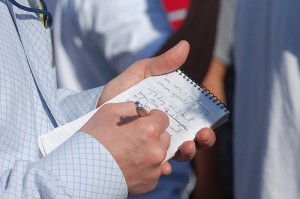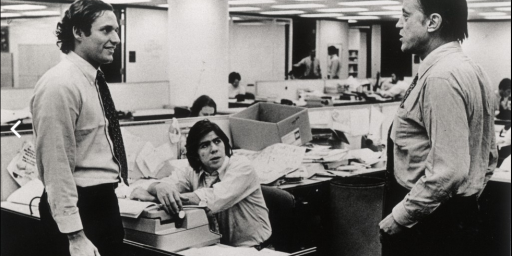Elite Journalists
 Deborah Howell, WaPo’s outgoing ombudsman, laments the downside of her profession becoming more professionalized.
Deborah Howell, WaPo’s outgoing ombudsman, laments the downside of her profession becoming more professionalized.
Journalism is better than it was in my early days, and changes in technology have opened up a new world. My worry is that journalists aren’t as connected to readers as they were in the days of my youth, when the city’s newspaper was the equivalent of the public square. Then, reporters tended to be folks who often hadn’t graduated from, or even attended, college, and they weren’t looking to move to bigger papers. They knew the community well, didn’t make much money and lived like everyone else, except for chasing fires and crooks.
Now journalists are highly trained, mobile and, especially in Washington, more elite. We make a lot more money, drive better cars and have nicer homes. Some of us think we’re just a little more special than some of the folks we want to buy the paper or read us online.
That’s a mistake. Readers want us to be smart and tough and for the newspaper to read that way, but they don’t want us to think we’re better than they are. We need to be worried sick when people drop their subscriptions. We need to think of ways to prevent that.
An unpleasant fact about journalists is that we can be way too defensive. We dish it out a lot better than we take it. It’s not that we have thin skin; we often act as though we have no skin and bleed at the slightest touch.
Journalists need to find ways to be more a part of their communities and their interests — without crossing the line to partisanship — and to engage with readers in improving the newspaper and its Web site to be sources readers can’t do without. If something drives readers nuts, what can we do to help them?
Journalists need to be tough enough to face down a mayor, a police chief or the president of the United States, but we also should be tough enough to respond to honest criticism. The worst part of my job as official internal critic hasn’t been dealing with readers, though that has been both daunting and rewarding. Taking those complaints to reporters and editors has been the biggest challenge. I’m grateful to those here who took them seriously. Some readers had complaints that I just couldn’t get to; I regret that. Some journalists think I have been unfair to them. If I have, then they know how people who believe The Post has treated them unfairly feel.
Politico’s Michael Calderone takes her point but observes, “Howell must run in more well-heeled circles than I do, since a good many journalists I know are barely scraping by or getting laid off — ‘better cars’ and ‘nicer homes’ aren’t the first things on every scribe’s mind these days.” That’s a fair point: young reporters make meager salaries because the supply of quality applicants far outstrips demand. That said, though, those who are successful do quite well, indeed.
When I was teaching Media and Politics courses years ago, I showed an old program I had taped (perhaps an episode of “Frontline,” but I may be mistaken) that featured an interview with former CBS anchorman Walter Cronkite, once widely regarded as The Most Trusted Man in America. He lamented that reporters once had lifestyles and attitudes similar to police officers and firefighters and tended to live in the same neighborhoods and drink at the same bars as they did. That’s not the case for the mid-career journalist at major newspapers, magazines, and broadcast outlets.
But that’s not really surprising. Elite journalists are, at a minimum, college graduates — often from elite schools — and many go on to graduate or professional school. Outside of FBI agents and other federal agents, that’s just about unheard of for cops and firefighters.
UPDATE: A Mark Bowden piece in the July/August edition of The Atlantic illustrates Howell’s point wonderfully.
In those fat and happy days, the glory days of “serious” American journalism, the concepts of objectivity and editorial independence grew into a kind of public religion. The old yellow era of Hearst and Pulitzer, publishers who threw their weight around vigorously and would even instigate a shooting war if it boosted circulation, had given way to a time of more-genteel ownership, often the Ivy League—educated sons and daughters of the press barons. Even the name Pulitzer was expropriated; it became an annual award given to the best examples of serious journalism, and in most newsrooms became a far more coveted goal than increased circulation. There was a high wall, we were assured, between the business side of the newspaper and its editorial staff, and newsrooms were increasingly peopled by a new generation of white-collar journalists, gentlemen (and ladies) of the Fourth Estate, arbiters of style, taste, and decency, who took upon themselves the tasks of keeping government honest and educating the public. (In my 20-plus years as a newspaper reporter, I was always amused when skeptics suggested that I wrote just what the newspaper’s owner told me to write. If only they knew how mightily the newsroom looked down its nose at the business side of the operation.)
This vision of a newspaper, one that prevailed at the highest levels of the craft for decades, ensured that the paper was not just a propaganda mill, the house organ of some rich man or political party, but a community of street-smart shoe-leather scholars who worked as the eyes, ears, and conscience of their city. This was the world of the Pentagon Papers and Watergate, of David Halberstam’s and Neil Sheehan’s courageous reporting from Vietnam, and of countless other public-spirited examples of a responsible, serious journalism.
Even literary ambition began to creep into the pages of the great newspapers. At the best ones, when the material justified it, reporters were encouraged to write creatively and at length. A certain kind of reporter—and I was one—competed against others not so much for scoops, but for recognition, prizes, and tenured positions at papers where the rarefied work of “serious” journalism was underwritten. Mine was The Philadelphia Inquirer, where my byline read not “staff reporter” or “staff correspondent” but “staff writer,” and which we writers called, in its heyday, “the greatest care-and-feeding system for journalism ever invented.”
[…]
But while the Web is rapidly destroying the business model that sustained all of the above, it has yet to develop institutions capable of replacing print newspapers as vehicles for great in-depth journalism, or conscious of themselves as upholding a public trust. Instead, the Web gives voice to opinionated, unedited millions. In the digital world, ignorance and crudity share the platform with rigor and taste; the independent journalist shares the platform with spinmeisters and con artists.
Story via memeorandum. Photo by Alex Steffler under Creative Commons license.






I think I dispute the first sentence of this post, James. What’s happening to the newspapers is at least in part a consequence of the unsuccessful attempt at professionalizing journalism. When you send kids to elite schools and give them journalism degrees, you get elitists with exaggerated expectations of the income they’ll earn working for newspapers. You don’t get reporters.
Most of the great reporters of yesteryear didn’t even go to college and those that did didn’t go to Hahvahd. Heck, neither did most of the great newspaper columnists, either.
Mike Royko didn’t go to college. George Will, on the other hand, went to Trinity.
I think that’s mostly right. Surely, the wage scale is sufficiently publicized that prospective journalists are at least vaguely aware of it.
My sense is that the problem’s not so much that they think reporters make more than they do but that they don’t really want to be reporters to begin with. Almost everyone aspires to be either a columnist or a do-gooder Investigative Journalist in the Woodward and Bernstein mold. Few are interested in hanging out at city hall or the courthouse or the police station doing beat reporting.
That’s about right. There’s always the Lotto Syndrome: judging your worth by the most highly compensated in the field rather than by the typical, counting on winning the lottery as a business strategy.
Back when I was thinking about what I wanted to do when I grew up (I still haven’t figured that out) my parents hit on an intriguing strategy: they had me spend the day with a friend who made his living at whatever I was interested in. One of those was the Managing Editor of the St. Louis Post-Dispatch. That pretty well discouraged me from journalism.
I’ve actually become a bit worried now that my local paper is cutting staff in half (again) … who’s going to cover the city hall stuff? If no one is reporting on what local government officials are doing, it’s ripe for scandal.
You need only look back at the way Sarah Palin was interviewed by Charlie Gibson and Katie Couric to see what has gone wrong with journalism. I’ll always remember how Charlie Gibson postured himself to make certain “he” was the one who tripped her up. Katie Couric thinks she is a “media star” even though her “stardom” has taken her out of the media arena for just that reason. The United States is headed down a disastrous path in what we allow. The Washington Post was blatantly biased and admitted it. Fortunately, they have lost and will continue to lose subscribers every day.
Successful people tend to think they’re better than less successful people? OMG! Stop the presses! Clearly this is something that has only ever affected those evil liberal elitists.
Seriously, when I hear anyone complain about ‘elitists’ these days it pretty much tells me I can safely ignore this idiot.
It’s like when I hear someone complain about the ‘radical homosexual agenda’. A red alarm goes off in my brain that says “Danger! High levels of tard particles detected! Eject! Eject!”
I wouldn’t fret, Franklin. Chicago has some fine beat reporters, and if you think that will stave off corruption…….well, perhaps you’ve seen the news recently.
Whether its Woodward wannabe syndrome, just plain bias, or the requirement to be half entertainer, quality journalism is a rare commodity today (particularly on the tube), and the profession has been in continuous decline for 25 years now.
The head-in-the-sand denials of partisanship, mostly liberal oriented, on the part of the vast majority of the media are all fine and well for bar room or internet site spitball fights. But as all those poll citing reporters should understand, a fed up consuming audience and their decision to tune out in favor of alternatives is undeniable and the ultimate poll. This was really a form of suicide, as it put these media outlets in a terribly weak position when the web (or other alternatives) came along. I suspect its too late for those media outlets to really recover, except as much diminished niche players.
It is ironic and somewhat amusing that one of the losers, and vocal complainers, about the complete collapse of journalistic integrity that characterized the recent Presidential campaign was Hillary Clinton, formerly a beneficiary. One wonders how long Obama will continue to get a complete free pass. His implicit and explicit (few as they were) campaign promises fall roughly into two buckets: 1) absurd on their face and 2) extremely difficult to fulfill given real world realities.
When this becomes apparent, as surely it will, does Obama get his turn to be “Hillaried” for the benefit of the next smooth talker coming down the line? His honeymoon with the media may be short lived, given their large egos combined with his tendency to be testy.
Is Obama getting “favorable” press? Of course. He is the PE, he hasn’t had to actually do anything yet, he has the highest approval rating of any PE in history(?) etc, etc, but Drew, I have to object to this statement:
“Complete”? How many headlines have you read linking Obama and Blago directly, even tho PF says Obama (or his team) have done nothing illegal, are not a target in any way shape or form? How many articles have you read detailing the Obama/Blago “connections”? How many op/eds have you read demanding that Obama “come clean”? All this despite the fact that Blago is on tape saying, “Obama won’t give us nothing but appreciation. F*ck him.” And I haven’t even brought up Rick Warren.
A “free pass” he hasn’t gotten. In the meanwhile, keep your powder dry. Soon enuf some of his promises will hit the brick wall of reality, soon enuf he will screw something up… They all do.
tom p –
I wouldn’t drop the term “complete” just because of two weeks coverage out of the last two years. But I won’t quibble – “almost complete” free pass. But press coverage for two years has been an absolute embarrassment to the profession.
I’ve been in Hawaii for two weeks, so I haven’t seen squat written about the Obama Blago connection, but news is sparse here, and my attention diverted.
But I did hear that he sent out a Christmas Eve press release stating that “nothing inappropriate happened.” Have the press followed up? Or swallowed it whole? Can you imagine George Bush or Dick Cheney issuing such a release? The mad dogs would be howling.
Oh, and by the way. I doubt that Obama is part of any pay-to-play scam here. But do yourself a favor and google some IL politics stories. The Emil Jones/Obama/Blago connection is undeniable, and Emil and Blago aren’t exactly saints. Even though Obama is not said to be close to Blago (post his campaign work for him 6-7 years ago), he is attached at the hip to Emil Jones. Its like working in the same office as a crook but keeping your mouth shut.
“Journalism is better than it was in my early days…”
Well certainly not at the level of my local paper or the AP. Half the time I begin reading an article and several paragraphs in I still don’t know what it is about, due to the “cutesy” opening describing some starving infant or darling teenager in a stylish introduction before getting to the subject of the article. When the writer does finally get to the meat of the subject I get lost in convoluted sentence structure and indefinite articles. I seldom finish the article, usually pitching the dratted paper and looking the subject up on the Internet.
Journalism is the other profession that Eliot Spitzer used frequently and much, much cheaper.